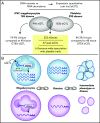eQTLs in platelets and iPSC-megakaryocytes
- PMID: 33599763
- PMCID: PMC7918182
- DOI: 10.1182/blood.2020009461
eQTLs in platelets and iPSC-megakaryocytes
Abstract
In this issue of Blood, the study by
Conflict of interest statement
Conflict-of-interest disclosure: The authors declare no competing financial interests.
Conflict-of-interest disclosure: The authors declare no competing financial interests.
Figures

Comment on
-
Transcriptional profile of platelets and iPSC-derived megakaryocytes from whole-genome and RNA sequencing.Blood. 2021 Feb 18;137(7):959-968. doi: 10.1182/blood.2020006115. Blood. 2021. PMID: 33094331 Free PMC article.
References
Publication types
MeSH terms
Grants and funding
LinkOut - more resources
Full Text Sources
Other Literature Sources

